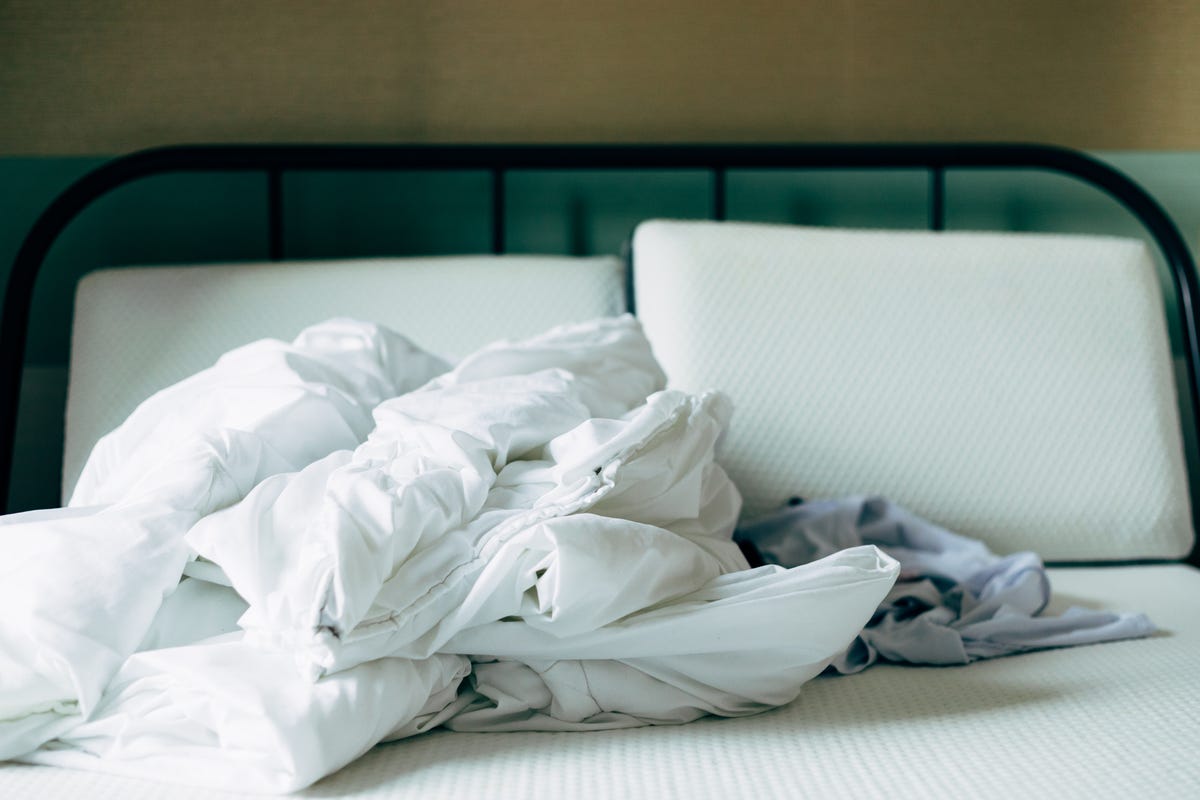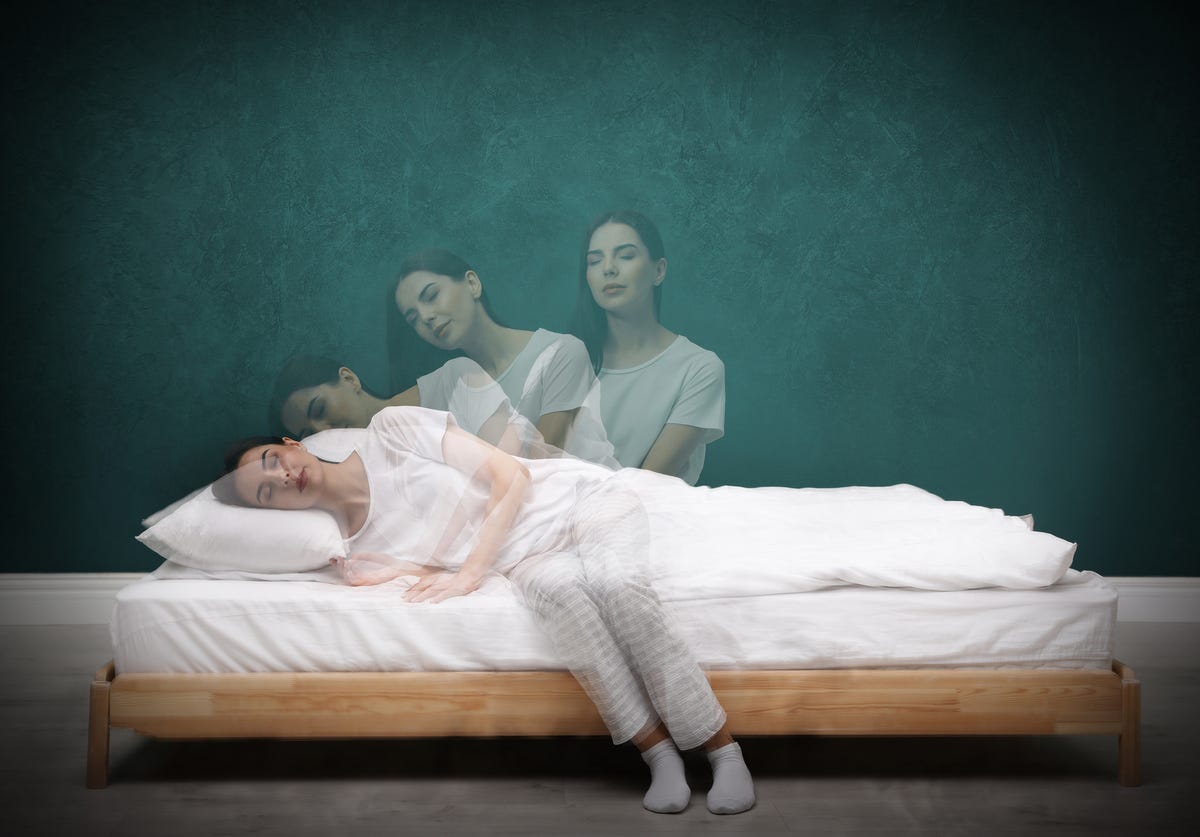Skipping pajamas is a trend. According to research by online mattress company Casper, 28.5% of Americans surveyed said they sleep naked, either daily, weekly, monthly or just once in a while. The other 71.5% said they never go to bed without wearing clothes.
Going to bed nude this summer might not be as cool as you think.
It's clear that sleeping nude isn't uncommon, but you might be surprised to learn that it isn't always the best choice. As with any trend, there are disadvantages you should be aware of, particularly if you tend to sweat or have sensitive skin. Below, we'll explain why you might want to rethink your bedtime attire and slip into some pajamas this summer.
Also, see how to sleep cool without AC and our favorite sleep accessories for beating the heat.
5 reasons you shouldn't sleep naked
When it's sweltering outside, sleeping naked might seem like a great way to cool down. While it can certainly offer relief at the moment, try to keep these things in mind before you disrobe this summer.
Read more: Best Mattress
Hygiene concerns
Every night, your sheets, pillows and mattress collect dust, oil, dead skin and sweat (which is why it's important to clean them regularly). You can't prevent this from happening, but you may be able to slow it down by wearing clothes to bed rather than sleeping naked.
Need another hygiene-related reason to cover up at night? According to Dr. Anthony Youn, a plastic surgeon based in Michigan, an average person farts up to 25 times per day, and if it happens at night, the expelled fecal material could get onto your sheets. Wearing underwear, he says, can help prevent these particles from spreading to your bed. (An important caveat: Youn notes that gynecologists sometimes advise women to sleep without underwear for their vaginal health. If that applies to you, make sure to follow your doctor's recommendation.)
No matter your nighttime clothing preferences, you'll still want to wash your bedding at least every other week. If you sleep naked, it's better to change your sheets weekly. You can also shower at night to keep your bed cleaner, but make sure to dry your hair first, otherwise, it could lead to fungi and bacteria growth on your pillow.
It's also essential to take care of your mattress, particularly if you're a nude sleeper. This means thoroughly vacuuming and scrubbing it twice per year and replacing it every decade or so.
Temperature
You'd think sleeping in your birthday suit would help keep you cooler, but it can actually work against you. Wearing light and breathable pajamas to bed can help wick away and absorb moisture. By sleeping naked, if you sweat, your moisture has nowhere to go but your sheets and mattress, creating a damp and uncomfortable sleeping surface.

Allergies and sensitivities
When you sleep in the nude, there's no barrier between your body and your bedding, which can cause a quicker build-up of things like dirt, oil and dead skin. This isn't just gross; it can actually cause health problems if you have certain allergies or sensitive skin. Here's why.
As you sleep, your body sheds dead skin cells, which attract dust mites that then feed on this dead skin. If you're one of the 20 million Americans who are allergic to these mites, you might notice symptoms like congestion, coughing and sneezing.
Also, depending on your bedding, sleeping with your skin directly against your sheets could lead to uncomfortable side effects like rashes and irritation. Sleeping without clothes on certain types of sheets (such as ones made of polyester or other synthetic materials) isn't recommended if you have conditions like eczema or psoriasis. Instead, experts suggest sticking to breathable, natural fabrics (such as cotton and silk).
Difficulty getting to sleep
For some people, being in the nude can feel awkward and unnatural. If you go to bed without clothes, but being naked isn't comfortable for you, you might have a hard time settling into sleep. As a result, your sleep quality could decline, which could lead to irritation, trouble concentrating and memory issues.
Similarly, if you go to bed in uncomfortable clothing, you could also face sleep problems. When picking out bedtime attire, choose whatever puts you at ease, whether that's an old T-shirt, a matching set of pajamas or a nightgown.
From Cooling Sleep Masks to Pillows to Sunrise Alarm Clocks: All of CNET's Favorite Sleep Essentials
See all photosExternal factors and exposure
Aside from the hygiene and health risks of sleeping in the nude, there are other practical concerns to consider as well. First, clothes can also act as a protective barrier against hungry spiders and insects. They might not completely stop you from getting bitten, but they provide an extra layer of defense.
On a different note, going to bed naked could land you in some uncomfortable situations if you have roommates, live with your children or parents, travel often or sleepwalk. For instance, things could get awkward if you're on your way to the restroom in the middle of the night and unexpectedly run into someone else in the hallway.
Even worse, if there's an emergency, you might not have time to get dressed before taking action. That could be potentially awkward or embarrassing, especially if you have to evacuate your home for a fire or other unexpected situation.

Too long; didn't read
Going to bed naked might not put you at risk for serious, life-or-death health problems, but it's worth thinking about the risks involved in sleeping nude. Importantly, sleeping without clothes can increase the build-up of dirt and dust mites, which can trigger allergies and make your bed a less hygienic place to sleep.
Ultimately, the decision of what to wear to bed is a personal one. If you're more comfortable sleeping without clothes, there's no real harm in continuing to do so, but you should aim to change your sheets every week to keep them free of dirt, dust, sweat and other nasty bedfellows.